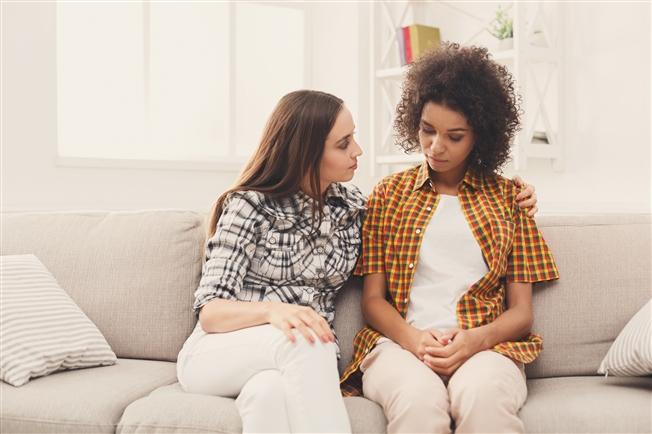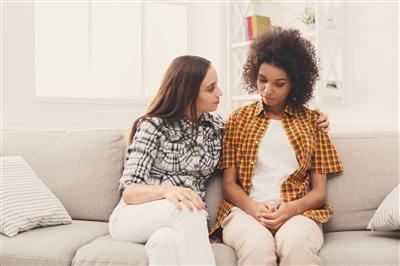What not to say to someone with depression during holidays


Unlike the holiday blues, that bit of melancholy you may feel when remembering holidays past and family members no longer here, or the post-holiday letdown and reminder that it’s now dead of winter with shorter days and longer nights—clinical depression is a mental health disorder that lasts longer than two weeks.
“Depression may present in anyone at any time of life, but certain populations are particularly susceptible due to physical and hormonal changes, or stages of life, such as postpartum women, women approaching menopause, and elderly people living alone,” explains Val Cannon, MSW, LSW, clinical director of Mirmont Treatment Center, part of Main Line Health, which offers inpatient and outpatient behavioral health services. “Around the holidays, there is so much additional stress as well as demands on finances, personal relationships, and time and energy, it can really exacerbate an existing depressive disorder or trigger a depressive response.”
Signs of depression around the holidays may include:
- Feelings of hopelessness or despair, like “what’s the use in life?”
- Negative “rumination” or allowing worrying and upsetting thoughts to keep playing over and over again
- Loss of sleep or wanting to sleep all the time, to hide from the world or pass the time
- Lack of interest in being social and no joy in doing the things you usually like to do
- Increased use of drugs or alcohol to numb or spark feelings or to “check out” of life
Seniors with depression may forget to take their medications or neglect their personal hygiene. In some people, clinical depression leads to thoughts of harming oneself and making plans to commit suicide.
For a referral to a Main Line Health behavioral health specialist, call 1.888.CARE.898 (227.3898). For 24/7 emergency support, visit a Main Line Health emergency room at Lankenau Medical Center, Bryn Mawr Hospital, Paoli Hospital or Riddle Hospital.
If you’re in crisis and need to talk now, call the National Suicide Prevention Lifeline at 800.273.TALK (8255) or visit suicidepreventionlifeline.org.
You can also contact the Crisis Text Line by texting TALK to 741741.
Some people experience seasonal affective disorder (SAD), brought on by changes in the number of hours of daylight. The symptoms of SAD are similar to symptoms of depression and the experience is just as debilitating for people with this disorder.
How to help someone with depression around the holidays
While you may feel inclined to help someone “cheer up,” being cheery may not be possible for them right now. In fact, here are seven things you should never say to someone with holiday depression—and some suggestions for how to talk about this touchy subject:
1. You have so much going for you.
For people who are dealing with depression around the holidays, this statement implies that if only they were grateful for what they have and were present to what a great person they are, they wouldn’t be so depressed. People with holiday depression may in fact be aware of what a great life they have, which may induce even greater feelings of guilt because the depression clouds their ability to feel joy and appreciation. The depressed person might be plagued with negative self-talk such as “What’s wrong with me?” “Everything in my life is going well, why am I so depressed?” So pointing it out to them is not helpful, but may in fact make them feel worse because they’re just not able to appreciate the good things in their lives right now.
Try saying this instead: I’m so sorry you’re having such a hard time. I know it doesn’t seem possible at the moment, but things will get better. In the meantime, I’m here for you if you just want to talk it out.
2. Drink up!
This is a not-so-veiled attempt to make light of a person’s low mood. It suggests that everything will be better if they just drink some alcohol. It’s also a way for people to commiserate over a drink and talk about just how lousy things are in their own lives as a way to distract the depressed person from the way they’re feeling. Unfortunately, adding alcohol—which is itself a depressant—is one of the worst things you can offer a depressed person. Even in moderation, alcohol can bring a low mood even lower, or in excess, can cause deepening feelings of loss, regret, sorrow and hopelessness.
Try saying this instead: I’m sure this is the last thing you feel like doing, but let’s go out to a movie or grab a coffee and browse the bookstore. I’ll come pick you up.
3. A nice walk will do you good.
This suggests that simply getting some fresh air will help resolve depression. While going for a walk is certainly a good way to improve mood and get the circulation going, walking is not a “cure” for depression during the holidays. In fact, depression often causes people to retreat into their homes and avoid exercise completely. The lack of activity feeds an even more depressed mood and the cycle continues. It may be very difficult for a depressed person to get motivated to go for a walk—even though it seems like such a simple thing to do.
Try saying this instead: I don’t want to minimize how you’re feeling, but I do think it would be good to get outside for a few minutes and just take some deep breaths. How about we take a 15-minute walk together?
4. Just snap out of it.
With clinical depression, there is no such thing as “snapping” out of it. This statement implies that a depressed person can turn their depression on and off like a light switch, and if only they focused on the positive things in life, they could pull themselves out of this low mood. Depression involves chemical changes in the brain that may be caused by trauma, loss of a loved one, hormonal changes, a genetic predisposition to depression, or nothing much at all. Telling a person to snap out of it shows them just how little you understand about their condition and may cause them to stop sharing themselves with you.
Try saying this instead: I can’t imagine what it’s like for you right now and there’s nothing I can say to make things better. But just know that it’s okay to feel whatever you’re feeling without trying to fix it.
5. I was depressed once.
Only say this if you really were diagnosed with depression and treated for it. Otherwise, it comes off as superficial and lacking in empathy. It may be even more frustrating for your depressed friend or loved one to have to listen politely to your tale of woe when you’re supposed to be doing the listening. If you really do understand depression, then keep the focus on the other person and be a good listener who also happens to have had depression.
Try saying this instead: I can really relate to everything you’re feeling and going through. Depression is such a hard thing to deal with, especially around the holidays. I’m not sure how I can be of help, but just know that I’m here for you.
6. You need to get out and meet people.
This is another comment that suggests that being social and engaging with other people during the holidays will cure depression. Getting out and meeting people may be the last thing a depressed person wants to do and hearing it from you is not what they want to hear. While it is important for people to stay connected with other people, a person who is depressed may not necessarily benefit from a social gathering. Clinical depression during the holidays can make a person feel isolated and alone even when gathered with other people. Holiday parties and festivities may even worsen the feeling of loneliness or negative self-talk: “I know I should be enjoying myself but I’m not. What’s wrong with me?”
Try saying this instead: I know you might not be in the mood for this, but we’re having a holiday get-together this weekend. I would love for you to come but if you’re not up for it, I totally understand. If you don’t mind, I’ll keep inviting you to things.
7. C’mon, you’re supposed to be happy, it’s the holidays!
Implying that there’s a way that things “should” be is problematic for most people, especially someone who’s depressed at what is “supposed” to be a joyous time. This is something people might say when they’re not sure what else to say when faced with someone else’s low mood. It trivializes a person’s depression, again suggesting that it’s just something that can be set aside momentarily for the sake of holiday enjoyment. It’s best to avoid any suggestion of “should/shouldn't,” “have to,” “need to,” and “supposed to.”
Try saying this instead: I’m sorry to see you so down for the holidays, but I totally understand this is just how you’re coping at the moment. If there’s anything I can do to be of help, please let me know.
If you’re ever in doubt about what to say in the moment, sometimes it’s helpful to just say nothing and listen without judgment. That may be just the help someone with holiday depression needs.
And by all means, if your friend or loved one is using drugs or alcohol to self-medicate, or has been experiencing signs and symptoms of depression for several weeks or more, be the person who encourages them to get help for addiction or see a therapist.
“We work with many patients with major depressive disorder who benefit from tools such as cognitive behavioral therapy, in which we help retrain the brain and introduce new thoughts that produce new neural pathways,” says Cannon. “For some people, it’s a combination of therapy and medication, to help ‘reset’ the way neurons are firing in the brain. We encourage people to get help for depression when they’re first noticing signs or symptoms rather than suffering for long periods of time and putting their health and well-being at risk.”
Main Line Health serves patients at hospitals and health centers throughout the western suburbs of Philadelphia. To schedule an appointment with a specialist at Main Line Health, call 1.866.CALL.MLH (225.5654) or use our secure online appointment request form.
 Content you want, delivered to your inbox
Content you want, delivered to your inbox
Want to get the latest health and wellness articles delivered right to your inbox?
Subscribe to the Well Ahead Newsletter.
